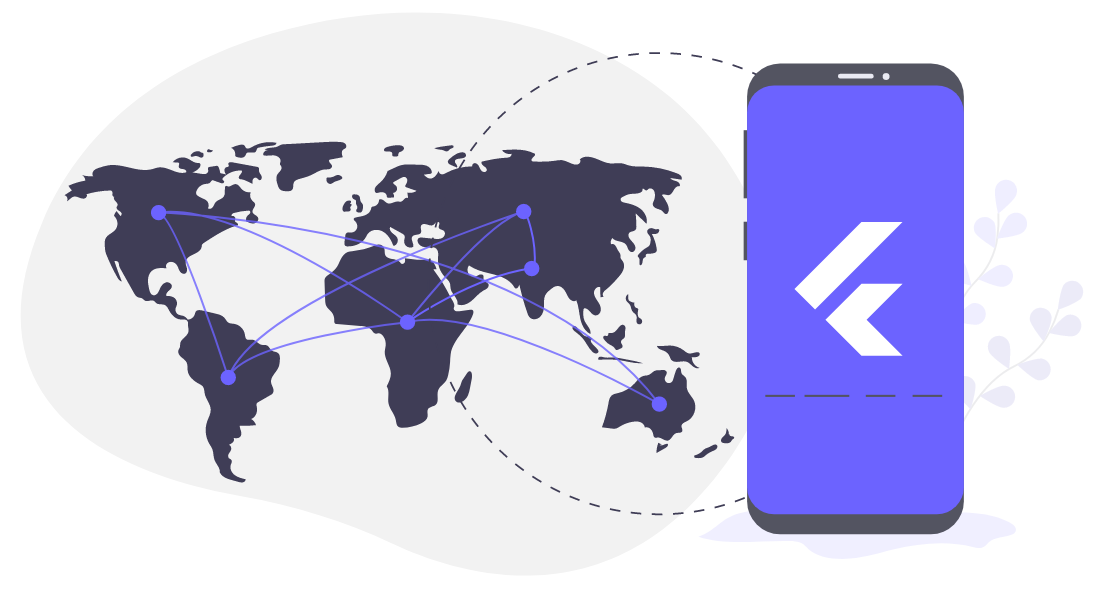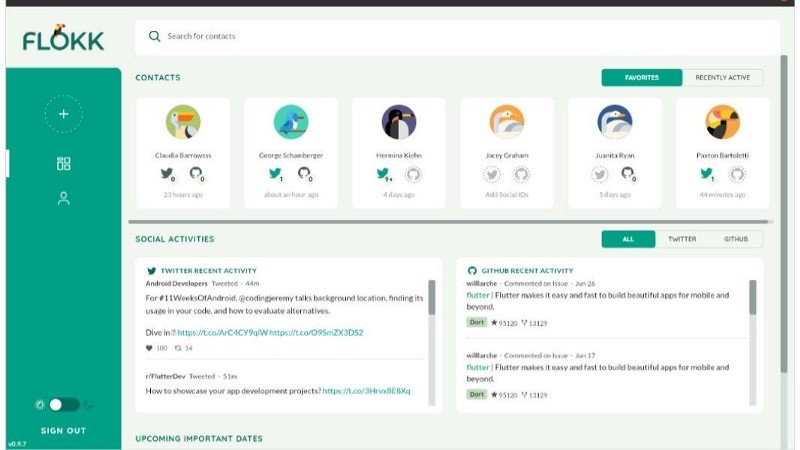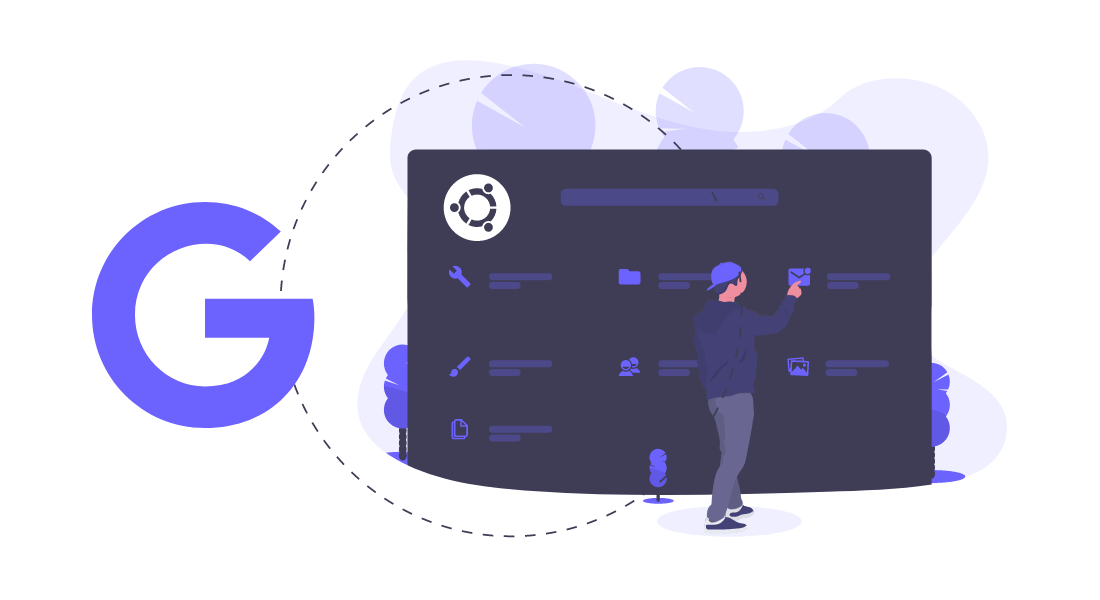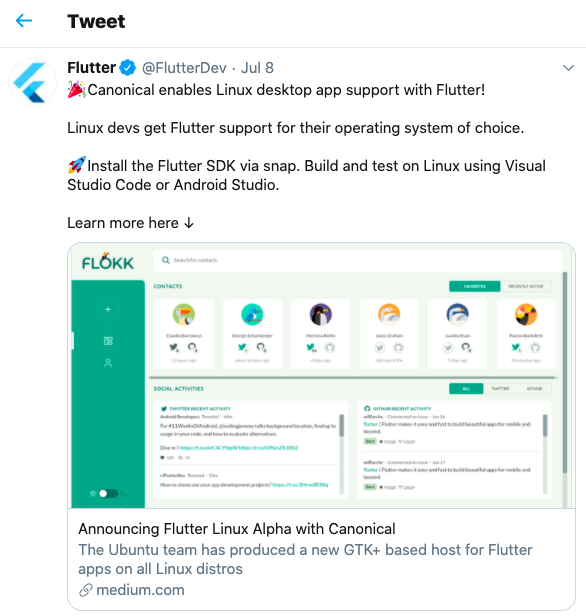Google has always been at the forefront of innovation. From designing Gmail to Google Docs, Google Android, or apps such as Google Meet, they never fail to keep their users apprised. Google's Android Studio has been the get-to-go for thousands of developers when designing and building mobile apps. It is, in fact, the official IDE, facilitating the development of Android apps.
Fascinating, right?
But this is something we all are aware of, so why bring this topic again? Because Google is now in talks with Canonical, the publisher of Ubuntu to team up and bring Flutter Apps to Linux.
You heard that right. But before getting into the depth of this partnership, let's have a look at the Flutter app development services spread across the globe.
Table of content:
Flutter App Development Services Across the World
Flutter is a Google-developed cross-platform app development framework. Put simply; Flutter allows the development of apps that can run effectively on Android, iOS, and macOS.
When Flutter was launched in the app industry, it took everyone by surprise. Google has always focused on the development of Android apps. Releasing a cross-platform app development framework meant that developers could now use the same code to build apps for different platforms.

This would not only cut down the time taken to develop the application but, at the same time, ensure consistency across all applications. Even though there was multiple cross-platform app framework already in the industry, the release of Flutter caught the interest of all because of its user-friendliness. There are multiple Flutter app development companies that help get the most out of the application. You can also choose to hire Flutter developer to get your job done.
Wondering what exactly is Flutter?
Back in May 2017, Google announced the launch of a new framework that would help developers build a cross-platform app with ease. The core of Flutter is based on Dart and React. In fact, few of the Flutter Dev are of the view that it isn't just a framework but an entire software development kit. It has everything you would need to deploy a cross-platform app.
Factually, Flutter revolves around widgets. From structural to the stylist element, Flutter's UI is composed of widgets. What's more intriguing is that Flutter doesn't make use of OEMs. It has a rich repository of self-made, custom-fit widgets that can be used to design appealing applications.
As per the views of Wm Leler, "Flutter is the only mobile SDK that provides reactive views without requiring a JavaScript bridge."
Fascinating, isn't it?
Imagine taking this on a whole new platform? Wouldn't that sound more interesting? Without much ado, let's see
You may also like to read:
Everything You Need to Know About Flutter 1.17 and Dart 2.8 (First Stable Update of Flutter and Dart in 2020)
Google collaboration with Ubuntu

Google and Canonical have teamed up to bring Flutter to Linux. What this means is that Flutter can now be used for the development of Ubuntu Linux Apps.
In a blog post, Google addressed,
“Today, we are happy to jointly announce the availability of the Linux alpha for Flutter alongside Canonical, the publisher of Ubuntu, the world’s most popular desktop Linux distribution.” “Canonical is making a significant investment in Flutter by dedicating a team of developers to work alongside Google’s developers to bring the best Flutter experience to the majority of Linux distributions.”

Canonical, in addition to having Ubuntu Linux, owns a Linux only app store that has all of the distributions of Linux developed using the Snap Package. This is known as the Snap Store. With Flutter coming into the picture, Snap Support would turn important more than ever. Even though the same wouldn’t be a necessity, the presence of snap support would be a plus for the Flutter App Development Company when working on the development of Linux Apps.
“By enabling Flutter Linux desktop, Canonical is making it very easy for application developers to publish their apps for Linux users via the Snap Store, the app store for Linux,” writes Google’s Chris Sells and Canonical’s Ken VanDine.
“By making Linux a first-class Flutter platform, Canonical is inviting application developers to publish their apps to millions of Linux users and broaden the availability of high-quality applications available to them.”
The release is presented in the alpha stage, but one thing that can be said for sure is both companies are proactively working to take Linux apps to the next level. This would not just break the traditional barrier but, at the same time, enhance the end to the end-user experience.
VanDine’s statement, “Canonical will continue to collaborate with Google to further improve Linux support and maintain feature parity with the other supported platforms,” vouches for the above.
Benefits of Flutter and Ubuntu
Having said that, it’s time to focus on the plus side of the collaboration, which means that we will now uncover the advantages of the perks of the collaboration. As evident, Flutter is one of the top cross-platform app development frameworks with built-in widgets facilitating the development of a feature-rich app.
Google partnering with Ubuntu calls upon the need for a native app-like speed, quick and swift development, along with the support of a huge community. But that’s just one way to narrowing down the benefits of Flutter app development for the Linux platform. To avoid the confusion, here we have outlined the top benefits of the collaboration.
Improved User Experience
It is known that apps developed using the Flutter framework are both consistent and quality-driven, offering rich user experience. Taking this to the Linux platform will allow the users to switch from the traditional browsing experience to something that is extremely engaging and eye-catching.
Alpha-Quality Features
For years, Google has worked upon Flutter to embed the best-in-industry features. In addition to this, Google devoted tons of resources to design the framework right and induce components that render top-notch experience. As a matter of fact, Flutter has components both for Android and iOS applications. What this implies is that Google has iOS-specific components that embed the look and feel of an iOS app.
Flutter has now released the alpha quality features that are targeted towards the development of traditional desktop apps. Put simply, Flutter on Linux would be implemented in the form of a wrapper around the GTK+. Further, as per the project, support to be provided to the Windows platform is yet to be released and is under development.
Custom Widgets Simplifies The Development Process
As stated above, Flutter has a rich library of built-in widgets that can be used for the development of apps. Now, this comes in a good as it eliminates the need to be dependent on third-party applications. Everything in Flutter moves around widgets, making it easier for the developer to craft consistent applications with custom designs.
What’s best about using Flutter for the development of Linux Apps is that there are more than 80,000 apps already built-in Flutter, which can be imported to Linux. All that a developer needs to do is refactor the applications to turn them desktop-compatible, and the job is done.
Top-notch Performance
What attracted Canonical to Flutter was its ability to build native-like, performance-rich applications with ease. If we talk about the factors that influence the performance of an application, there are tons of it. Starting with the number of frames per second to the CPU usage and the response time, in order to make an application outstand others, it is necessary that the performance is above average.
As for Flutter, the rate is 60fps, which is not just better but higher in comparison to other cross-platform app development frameworks. From what it’s worth, the collaboration of Flutter and Ubuntu seems to be the game-changer in the app development industry.
You may also like to read:
Best Flutter Libraries, Tools, Packages and Plugins (To Speed up Your Flutter App Development)
How To Install Flutter on Ubuntu?
Having said all of the above, it seems pretty exciting to add Flutter to path Ubuntu or say, use Google Flutter with Ubuntu. Well, don’t worth it, you don’t have to revisit Google and search for Flutter tutorial. We have done the job for you. The following section would outline the steps you need to follow to install flutter ubuntu.
Without much ado, let’s get started.
System Requirements: In order to install Flutter Ubantu, it is important to have your system updated with the following configurations.
Operating Systems: Linux (64-bit)
Disk Space: A minimum of 600 MB, which excludes the disk space needed to store IDE/tools.
Tools: Flutter being a CLI based framework, the following tools are a must.
Shared libraries:The following list of libraries are needed to run the Flutter test command.
libGLU.so.1 – provided by mesa packages such as libglu1-mesa on Ubuntu/Debian and mesa-libGLU on Fedora.
Installing Flutter
There are two ways to install Flutter on Ubuntu.
Option One: Type sudo snap install Flutter –classic in the command line of snapd or simply visit the Snap Store to install the Flutter framework.
Option Two:
For more details, visit Flutter tutorial here.
Future of this collaboration
The collaboration of Flutter with Ubuntu is a huge step taken by both Google and Canonical. This will not just add more creativity to the range of apps developed but account for a whole new era of development with extended support. While the current announcement is limited to the Linux environment, Google is assuring that developers could next target Microsoft’s Android Surface Duo smartphone along with Windows 10X and create Win32 apps.
Popular companies that use Flutter
Now the decision isn’t just for the developers but will also have an impact on the top companies that have been using Flutter as their core framework for development. From social media to the health care sector, there are tons of companies that work on Flutter to build effective cross-platform apps.
While Google Ads is just one name, social media apps such as KalsterMe, Meeve, Pairing, and E-commerce applications such as Alibaba are some of the apps built using Flutter. Not to forget the companies like Bacancy Technology, Intelivita, Netguru, QSS Technosoft, being the top contributors.
Conclusion
Wrapping up our discussion, it is pretty much clear that Google is on the journey of revamping the app development industry, shifting from a mobile-specific environment to providing desktop support. True that the collaboration seems to be exciting, calling up for new ventures.
However, it is only with time that we would be able to understand what the duo has in store for the industry. If you are looking for assistance to build beautiful native applications in record time, then get in touch with us today.
Bacancy Technology is a globally renowned Flutter app development company with a team of well-versed Flutter developers who can help you build sophisticated cross-platform apps along with a full spectrum of Flutter App development services.



